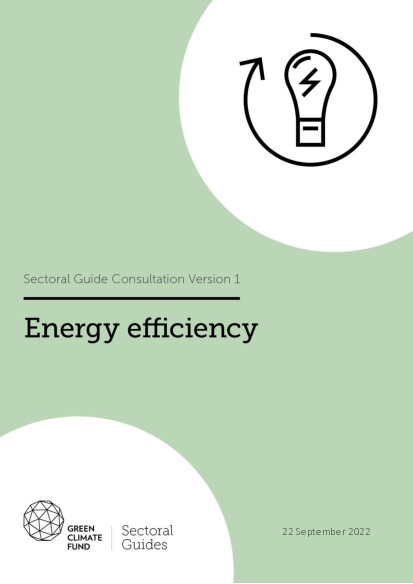Sectoral guide: Energy efficiency
On a global scale, energy efficiency (EE) addresses critical issues in the production, transformation, delivery, and consumption of energy – and associated materials and resources - across all economic sectors, societal groups, income levels and geographies. It is an essential approach for mitigating climate change by reducing energy-related CO2 emissions as well as reducing and offsetting energy demand growth.
Above all, there is an immediate need to consolidate and mainstream an effective, high-impact EE business model that (a) is adaptable and scalable to various country and regional contexts; (b) can deploy a diverse set of financial products through national or regional financing facilities in coordination with GCF Accredited Entities (AEs) and National Designated Authorities (NDAs); and (c) can implement measures to ensure effective knowledge sharing, capacity building, and continuous product and service development globally.
Given the need to significantly reduce greenhouse gas (GHG) emissions during this decade to meet the Paris Agreement goals, GCF has identified the following three energy efficiency (EE) paradigm shifting pathways for advancing the highest climate impact projects and supporting country needs: (1) Scaling-up industrial energy efficiency, (2) Enhancing “space” energy efficiency, and (3) Catalysing rapid market switch to highest efficiency appliances/equipment. GCF is a fundamentally partnership-based institution, thus leveraging existing sectoral initiatives, coalitions, and platforms remains critical to creating multiplier effects and to promoting joint learning and knowledge transfer. Investments aligned with EE paradigm shifting pathways can transform industrial sectors, the built environment, energy systems and appliances/equipment supply chains while meeting country priorities and beneficiary needs.
The sectoral guide draft was released for consultation between May 2022 and August 2022. The Secretariat received more than 125 suggestions and recommendations which are addressed in the current version of the guide. The sectoral guide will be submitted to the GCF Board for its consideration in 2022. In the meantime, GCF remains open to further feedback on this draft. For further inquiries please contact us via: [email protected].
